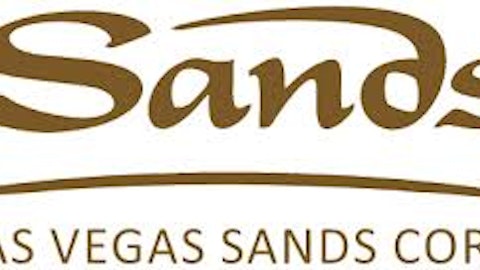A key concern for many casino investors is slowing growth in Macau. However, this has proven to be a lot less of an issue than what the market originally expected. The subsequent market correction has sent casino shares soaring by the double-digits. New issues, however, have arisen for MGM that can ultimately bring similar returns if resolved in an appropriate manner. Below, I present my take on LVS and MGM.

Las Vegas Sands has now risen around 70% from the 52-week low–largely driven by Macau experiencing less deceleration than expected. In 3Q12, Macau gambling revenue rose 7.9% y-o-y as a result of greater popularity among the middle-class demographic. In fact, Macau’s third quarter 2012 gambling revenue went up by 19.3%, which actually marked acceleration. And even though the company’s fourth quarter EPS of $0.54 missed consensus by 5 cents, revenue was in-line, and the stock price still jumped 4.2% after hours.
The gaming win share was 20%+ in the month of October. Table revenue performance in Macau expanded by 26% y-o-y, and winnings per mass table rose to $8,700. The only real negative is that, in the fourth quarter, margins fell from a $240 million tax loss on the Marina Bay Sands. And now reports are coming out that Macau resorts are selling out ahead of the Chinese New Year, and Capital Securities is now saying that LVS will see its biggest surge from expansing to 40% of all rooms in the booming region. So much for those Macau concerns.
At the same time, the company has been aggressive in growth. After April 2012, the company added two casinos and over 3,600 hotel rooms. The Parisian Macau Building project is also waiting for the local government’s green light to proceed, but the plan is to open before 2016. Management is also only shooting for projects that can deliver ROIs north of 20%. Sheldon Adelson, the company’s billionaire CEO, is also the company’s largest shareholder, so he has a vested interest in constructive, value-creating growth.
MGM Resorts International (NYSE:MGM): A Downside Story but With Turnaround Potential
In contrast to LVS, MGM faces a “downside story.” For some time, I have characterized MGM as the “danger” pick of the casino operators. While it generates an incredible free cash flow yield of 10.2%, it is still in the red and lost $1.34 per share over the trailing twelve months. It is expected to lose $0.35 per share more next year. Perhaps most pressing, net debt stands at $11.3 billion, which eclipses the $6.3 billion market cap. It is for these reasons that Deutsche Bank recently downgraded the stock to a “hold.”
The company is also a defendant in a widely-covered lawsuit. The plaintiff, MGT Capital Investments Inc. (NYSEAMEX:MGT), has gone through considerable restructuring, cost-cutting, and management turnover to get to where it is today. This messy process has, in turn, substantially discounted the stock, which now has a compelling value story that consists of monetizing patents. In mid-2012, the company acquired patent rights to a gaming system that to, put it briefly, consists of linking two gaming machines together to a bonus game that, when triggered, allows the players to compete against one another.
A few months ago, MGT Capital sued MGM Resorts and four other gaming companies–Caesars Entertainment Corp (NASDAQ:CZR), WMS Industries Inc. (NYSE:WMS), Penn National Gaming, and Aruze Gaming America–for violating MGT’s patent. The plaintiff is now looking for a slice of the revenues generated from each linked slot machine. According to a Forbes article that is bullish on MGT, there are “a minimum of 3,000 and perhaps 10,000, and growing” slot machines that potentially violate the patent. Each “linked” slot machine generates around $3,000 in sales per day. This translates to royalties of between $33 million and $100 million based on a 1% royalty fee. With Nixon & Vanderhye, a Tier 1 firm in patent law and IP litigation, representing MGT, I am confident the company will come away victorious. By broadening the infringement claim to casino operators, MGT is also placing pressure squarely on MGM’s management–something it definitely doesn’t need right now amidst all its troubles.
Accordingly, MGM may very well decide that the best path forward is to simply acquire MGT Capital. Such a decision would not be without precedence. In 1999, Acres Gaming filed a patent lawsuit against Anchor Gaming, and IGT then acquired the latter and used its resources to buy out the plaintiff at a 50% premium to the prevailing price. Interestingly, one of the defendants in the MGT Capital suit, WMS Industries, was recently bought out by Scientific Games Corp (NASDAQ:SGMS) at a 50% premium. As a global supplier of gaming products to casinos, Scientific Games is not very desirous to have its market under attack from a lawsuit. And since WMS shareholders are getting a nice premium for the transaction, they will feel the pressure to settle sooner rather than later. It should not be surprising then that that WMS characterized the transaction as an “opportunity of a lifetime.” Ceasers, meanwhile, is on track to lose $1 billion and has a considerable debt load of almost $20 billion. It doesn’t need this lawsuit on its plate right now.
Ditto for MGM, which, again, has net debt at nearly 2x the market cap and hundreds of millions in dollars piling up as losses. If the other defendants begin to settle, it won’t be long until MGT Capital calls MGM’s bluff. It already is a bit panicky about its own finances and–along with Caesers and WMS, in particular–doesn’t need any extra pressure. Right now, the best way that MGM can create value for its shareholders is through mitigating risks, cleaning the balance sheet, negotiating with Chinese regulators, and settling with MGT.
Conclusion
The casino issues faces several key issues ranging from increased Chinese regulation over gambling practices to balance sheet woes and lawsuits that tangle up management’s time. Decelerating growth in Macau isn’t one of them. For this reason, I recommend going long LVS despite its high multiples. MGM is more speculative; but, if it takes the steps that I mentioned above, it can start to build on its already strong free cash flow base. Meanwhile, LVS is still on track to realize more of the benefits arising from better-than-expected Macau growth.
The article Why LVS Is Positioned to Rise Over This Stock originally appeared on Fool.com and is written by David Gould.
Copyright © 1995 – 2013 The Motley Fool, LLC. All rights reserved. The Motley Fool has a disclosure policy.



